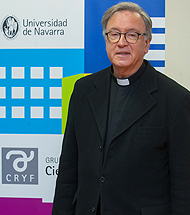Atheists and believers facing the uncertainty of the afterlife
Professor Javier Monserrat gave the seminar of group of research Science, Reason and Faith.

"Atheists and Believers Facing the Uncertainty of the Afterlife": this is the degree scroll of a book published by the Jesuit Javier Monserratpsychologist, philosopher and theologian, professor of the Pontifical University of Comillasand that was also the degree scroll of the seminar that the group of research Science, Reason and Faith (CRYF) of the University of Navarra organized on April 19 at classroom 30 of Central Building.
There are two ways of approaching the world knowledge . Insofar as the world is God's creature, science, which is a rational way of knowing the world, must also be a way of reaching a better knowledge of its creator. Fear of science should therefore be a foreign attitude to the believing man.
Until very recently, the image of the world and of man on Philosophy had responded to a theocentric vision of things. But the new image of the universe that science offers us does not impose on us an ultimate truth about reality, but rather places us before the experience of enigma. This ultimate truth of the universe is presented to us today as enigmatic for reason, and man is in a metaphysical uncertainty before the more metaphysical uncertainty before the beyond. This status, in Monserrat's opinion, would have given way "not to postmodernity, but to a critical modernity".
The believer also possesses an interior experience that is of a different order from that which is provided by reason alone. It is an interior witness, a presence that affects not only the believer but all men: all men, whether we want it or not, are affected by the presence of God, we are before God and before him we must decide our existence, affirmed the speaker.
Critical modernity sheds a new light on what since the patristic era has been called the silence of God. The experience of enigma related to that silence could have a meaning, and it brings a knowledge not only about the world, but about God himself who leaves men in freedom, a saving God who claims confidence that he has designed a Universe for our good and that he does not impose himself on us at our knowledge.





